A joint undertaking between the Southeast Asian Regional Center for Graduate Study and Research in Agriculture (SEARCA) and the Center of Excellence on Sustainable Agricultural Intensification and Nutrition (CE SAIN), in partnership with the Kansas State University (KSU) and the University of the Philippines Los Banos (UPLB), conducted the 1st and 2nd sessions of the e-training program titled, Trainers’ Training for Integrating the School-plus-Home Gardens cum Biodiversity Enhancement Enterprise in ATPs and Mini-ATPs in Cambodia (SHGBEE-Cam) on 1 and 8 December 2021, respectively, via the platform, Zoom. This collaboration generally aims to boost the capacity of teachers and local government offices by developing a core team with the added information, skills, and understanding for properly disseminating the needed concepts and values to students in the CE SAIN target schools for the Agricultural Technology Parks (ATPs) and mini-ATPs. The activity was attended by teachers, principals, officials, and representatives from CE SAIN, Raksmey Sophanna High School, Samdech Euv High School, Institute of Community Development, Sor Kheng Chanteu II High School, and Chea Sim Tbeng Meanchey High School, all located in Cambodia.
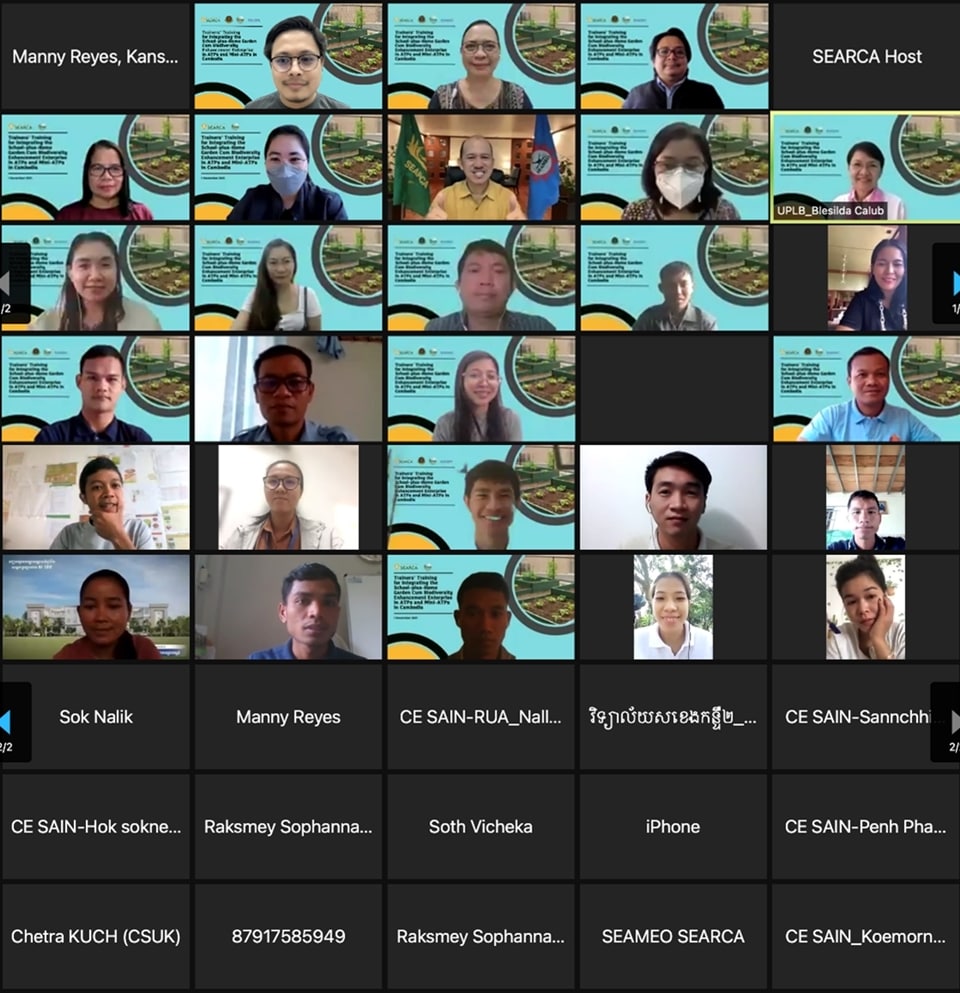 Organizers and participants of Session 1.
Organizers and participants of Session 1.
The learning event started with the welcoming remarks of Dr. Glenn B. Gregorio, SEARCA Director, who highlighted the significant role of the school-plus-home garden initiatives in battling food insecurity and malnutrition. Dr. Gregorio pointed out that this initiative is in line with SEARCA’s core belief that investing in nutrition for children and young people is one of the key strategies in achieving the Sustainable Development Goals (SDGs) by 2030. Further, he mentioned that the trainers-training is aligned to SEARCA’s 11th Five-Year Plan (FYP) with the theme of Accelerating Transformation Through Agricultural Innovation (ATTAIN) and also an important part of the celebration of SEARCA’s 55th year with the theme “Sowing Seeds of Innovation for Agricultural Transformation.”
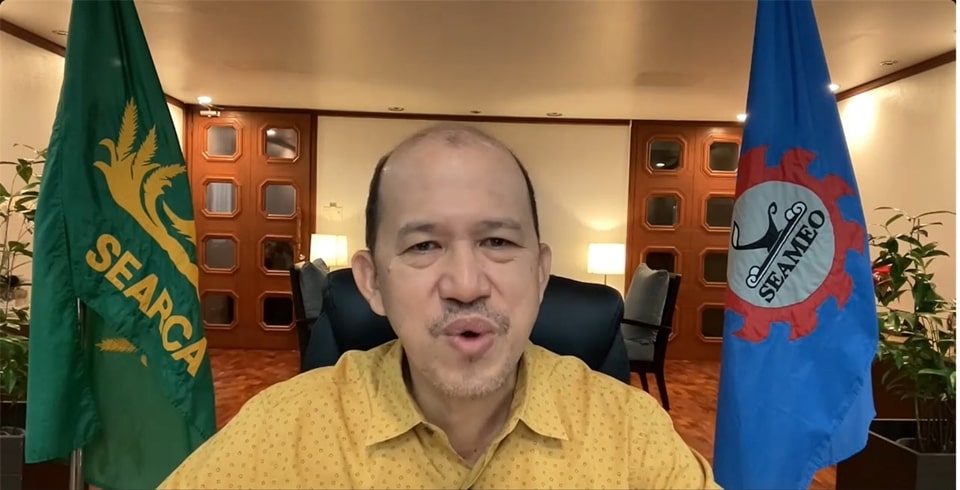 Dr. Gregorio welcomed the participants.
Dr. Gregorio welcomed the participants.
Shortly after, Dr. Manny R. Reyes, Research Professor at Kansas State University (KSU), delivered his keynote address by introducing the Conservation Agriculture for Organic Agriculture (CA4O4). He anticipated marrying the expertise of the Philippines in organic agriculture and the strength of Cambodia in conservation agriculture towards achieving the mission of growing and distributing nutritious healthy food profitably and equitable while enhancing soil-water-air-biodiversity health, mitigating climate change, and nurturing partnerships and peaceful communities. Dr. Reyes also underscored the role of the trainer-attendees in inculcating this knowledge to the youth, children, and their parents in their respective schools. Likewise, he encouraged all the participants to impart the concept of “new agriculture” to K-12 students.
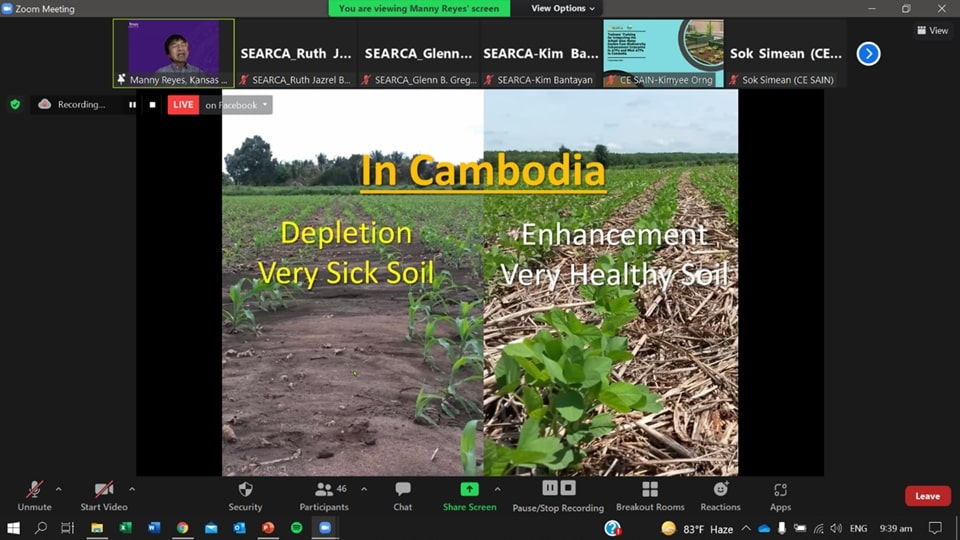 Dr. Reyes discussed the Conservation Agriculture for Organic Agriculture (CA4O4).
Dr. Reyes discussed the Conservation Agriculture for Organic Agriculture (CA4O4).
Dr. Pedcris M. Orencio on the other hand discussed the background overview of the SEARCA’s School Plus Home Gardens Project (S+HGP). He talked about the history of S+HGP in 2016-2017 which was piloted in 5 elementary schools and 1 high school in Laguna, Philippines, and supported the Department of Education’s (DepEd) two programs titled “Gulayan sa Paaralan Program (GPP)” and “School-based Feeding Program (SBFP).” Dr. Orencio also illustrated the scaling-up process in Laguna and Busuanga, Palawan which was determined from the initial six pilot sites to increase adoption both at schools and homestead levels. Thus, gave birth to fruitful impacts and outcomes for the benefit of the schools involved. He stressed that collaboration has transformed the perception into reality through the implementation of on-the-ground activities, creating supportive policies, and engaging community action. Lastly, he enumerated the modular approach for the technical training from Session 1 to 9. These sessions were specifically designed as a building block approach where all sessions are interconnected.
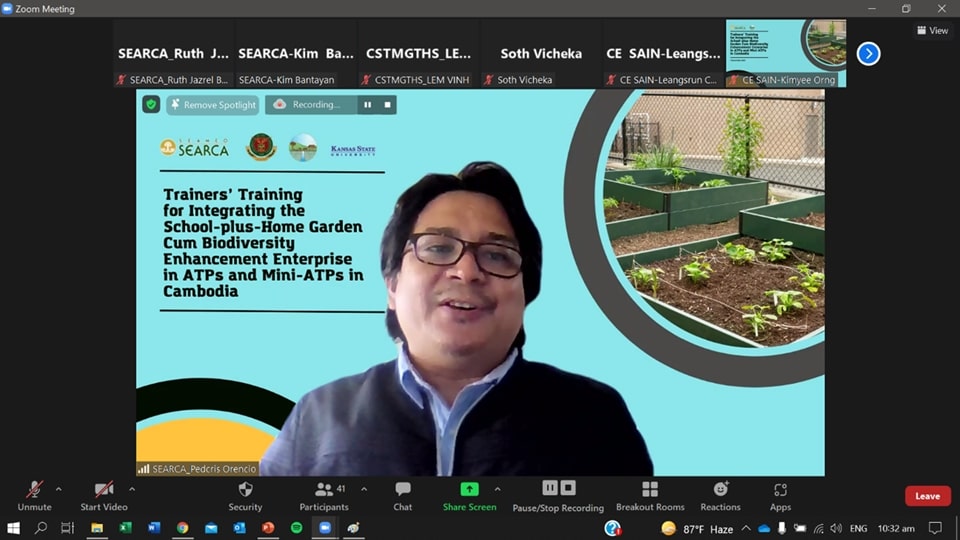 Dr. Orencio presented the background overview of SEARCA’s School Plus Home Gardens Project (S+HGP).
Dr. Orencio presented the background overview of SEARCA’s School Plus Home Gardens Project (S+HGP).
Session 1 of the e-training took off from Module 1 that featured the topic “Sharing Initiatives on School Gardens”. This contained the overview of the e-training course design and leveling off the expectations (topics, training modules, participants’ contributions to the success of the course, monitoring and evaluation of the course), methods that will be used in the training, and expectation setting presented by Dr. Blesilda M. Calub, Technical Coordinator and Facilitator of the SHGBEE Cam. Afterward, a pre-session evaluation test, facilitated by Ms. Anna Gale C. Vallez, Program Specialist of RTLD in SEARCA, was answered by the participants. Dr. Calub then began the e-training proper with the topic “Guiding Philosophy of Participatory Learning Programs” which required each school to discuss one philosophy and share experience they had to demonstrate that philosophy. This was followed by workshop activities for Session 1 which include a breakout session (school team mini-workshop) and plenary presentation of workshop outputs. The breakout session instructed the participants to answer two templates that harvested the data regarding the situation analysis of schools and school gardens in Cambodia. After the breakout session, the participants returned to the main session for the presentation of the workshop outputs. A post-session evaluation test was filled out by the attendees after the presentations.
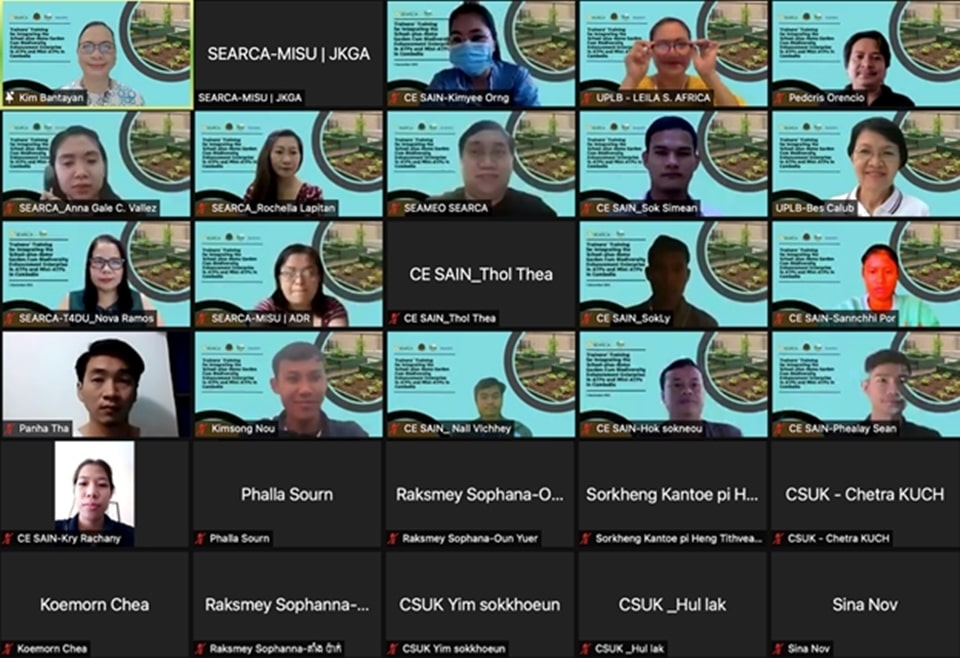 Organizers and participants of Session 2.
Organizers and participants of Session 2.
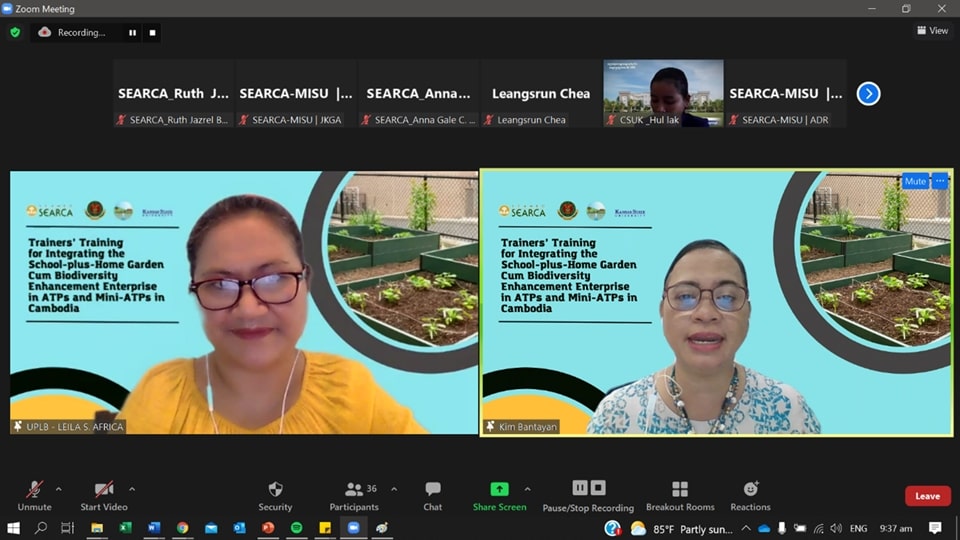 Dr. Africa discussed session 2 topics.
Dr. Africa discussed session 2 topics.
Meanwhile, session 2 which was held on 8 December 2021 was initiated by the participants summing up the previous session. Right then, Module 2 featuring “School and Home Gardens for Food and Nutrition” came about through a pre-session self-evaluation handled by Ms. Vallez. Session 2 was composed of two topics titled, “Nutrition-in-School and Home Gardens” and “Nutrition Planning and Monitoring” led by Dr. Leila S. Africa, Professor at Nutrition Programs and Policies Division, Institute of Human Nutrition and Food College of Human Ecology, UPLB. The lecture proper was followed by Q&A and breakout session and workshop. During the breakout session, the attendees responded to the Food and Nutrition Assessment covering the SBFP, weight and height measurement of students, and planning and monitoring. Representatives from the schools presented their outputs in the plenary session and a usual post-session self-evaluation was filled out by the participants. Lastly, reflection and synthesis which was facilitated by Dr. Calub highlighted the willingness of the schools to set up their feeding program and garden that will hopefully jumpstart the application of the S+HG concepts as the training moves forward.
The next session of the technical training on Biodiversity Enhancement and Environmental Sustainability will be on 5 January 2022 and will continue to run until 16 February 2022.